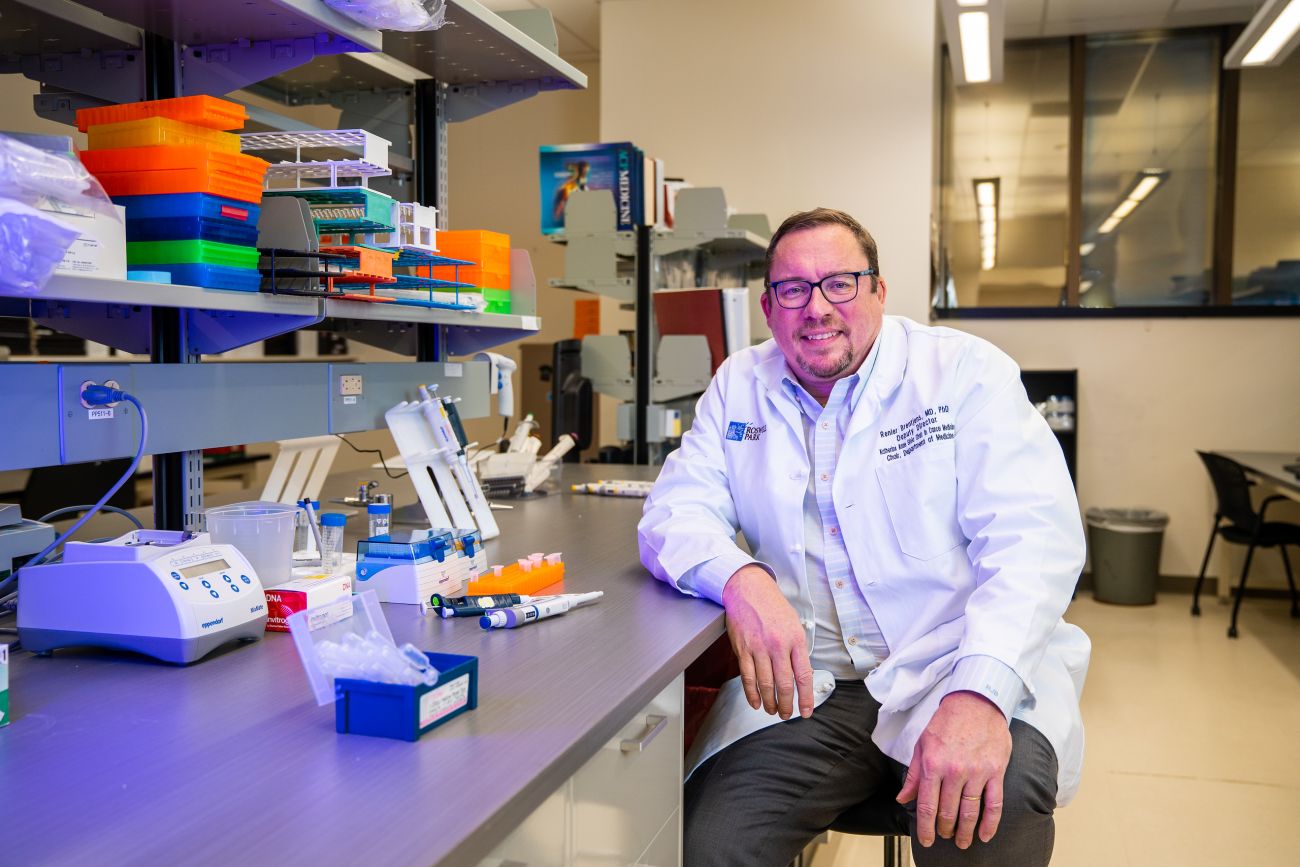Research led by Roswell Park advances possibilities for treating solid tumors with CAR T
- ‘Armored CAR’ T cells engineered to target DLL3 antigen and secrete IL-18
- Durable responses further enhanced with immune checkpoint inhibitor
- Approach may hold promise for other DLL3-positive neuroendocrine cancers
BUFFALO, N.Y. — A new approach to chimeric antigen receptor T-cell (CAR T) therapy has shown great promise against small cell lung cancer (SCLC) in a preclinical study. The findings cover new ground in our understanding of how CAR T can be employed against solid-tumor cancers, and provide support for further studies in cancer patients.
Renier Brentjens, MD, PhD, Deputy Director and the Katherine Anne Gioia Endowed Chair in Cancer Medicine at Roswell Park Comprehensive Cancer Center, served as principal investigator of the study, “IL-18-secreting CAR T cells targeting DLL3 are highly effective in small cell lung cancer models,” recently published in the Journal of Clinical Investigation. The research was a collaborative effort with researchers at Memorial Sloan Kettering Cancer Center and the Weill Cornell School of Medicine.
SCLC represents 15% of all lung cancers. At the time of diagnosis, two-thirds of patients have metastatic disease, which means the cancer has spread to other parts of the body — one reason median overall survival stands at just 13 months. Although tumors may initially respond to chemotherapy, the cancer almost always returns, underscoring the need for newer and more effective treatments.
CAR T-cell therapy, sometimes called a “living drug,” re-engineers a patient’s own T cells, part of the immune system that can attach themselves to cancer cells and destroy them. However, that’s possible only when a specific type of receptor on the surface of the T cell fits with a specific antigen, or protein, on the surface of the cancer cell. To ensure the right fit, T cells are separated from the patient’s blood and sent to a laboratory, where a gene is inserted to transform them into CAR T cells that are better able to seek out, attach themselves to and kill cancer cells bearing a specific antigen. The CAR T cells are then multiplied and returned to the patient to launch their attack.
The effectiveness of CAR T-cell therapy has so far been limited to blood cancers. Since 2017 the Food & Drug Administration has approved six CAR T-cell products to treat those types of cancer, but the same treatment approach has fallen flat in patients with solid tumors.
“First-generation CAR T cells have not yet demonstrated significant progress in solid tumors,” says Dr. Brentjens. He and his colleagues believe that’s because the tumor microenvironment (TME) — the blood vessels, normal cells and other elements surrounding the tumor cell — suppresses the immune system, causing T cells to become exhausted and unable to defend against cancer cells.
To overcome that problem, the researchers came up with a two-pronged attack strategy. First they developed CAR T cells that could home in on Delta-like ligand 3 (DLL3), an antigen found on the surface on SCLC tumor cells. Then they went a step further, upgrading them to “armored CAR” T cells that could express another molecule — in this case, interleukin-18 (IL-18), a protein encoded by the IL 18 gene that regulates the immune system’s response to disease.
In both xenograft and murine models of SCLC, the IL-18-secreting CAR T cells targeting DLL3 greatly increased anti-tumor activity, producing a stronger response than IL-12 and IL-16, two other interleukins evaluated during the study. IL-18 also reduced T-cell exhaustion, caused the DLL3 CAR T cells to multiply and live longer, and produced more T cells capable of “remembering” the DLL3 antigen so they could continue target it for destruction in the future. At the same time, IL-18 activated more tumor-infiltrating lymphocytes (TILs), immune cells that enter the tumor to kill it.
“Putting the IL 18 gene into those T cells allowed for much better eradication of the tumors,” says Dr. Brentjens. In fact, in xenograft SCLC animal models, the strategy resulted in complete destruction of H82 tumors, models representing recurrent SCLC. The researchers also noted significant improvement in survival when the IL-18-secreting CAR T cells were combined with a type of immunotherapy called an immune checkpoint inhibitor.
Because DLL3 is expressed in many neuroendocrine cancers — including high-grade cancers of the lung, prostate, breast, pancreas and intestinal tract, as well as low-grade gliomas and neuroblastomas — CAR T cells targeting DLL3 could provide new treatment options for those diseases.
“This is a next-generation CAR T cell,” explains Dr. Brentjens. “Now that we’ve shown this technology to be effective, we’re eager to advance the work to clinical-stage research assessing how effective this approach may be in cancer patients.”
###
Roswell Park Comprehensive Cancer Center is a community united by the drive to eliminate cancer’s grip on humanity by unlocking its secrets through personalized approaches and unleashing the healing power of hope. Founded by Dr. Roswell Park in 1898, it is the only National Cancer Institute-designated comprehensive cancer center in Upstate New York. Learn more at www.roswellpark.org, or contact us at 1-800-ROSWELL (1-800-767-9355) or ASKRoswell@RoswellPark.org.
Annie Deck-Miller, Director of Public Relations
716-845-8593; annie.deck-miller@roswellpark.org
